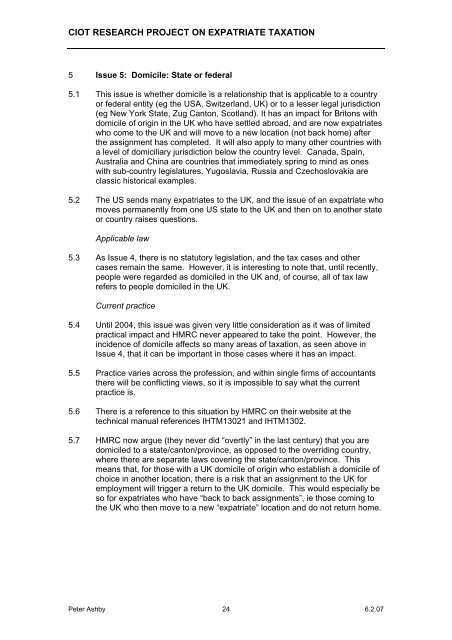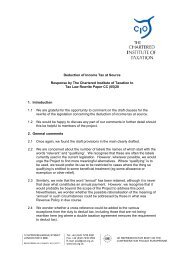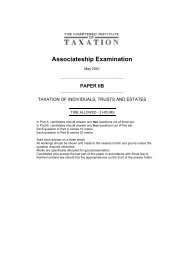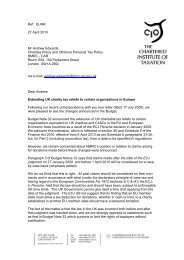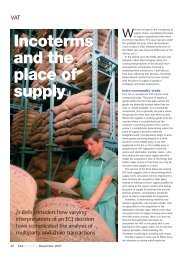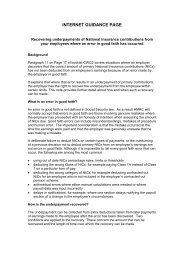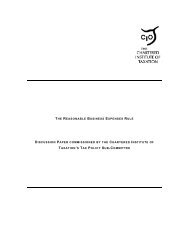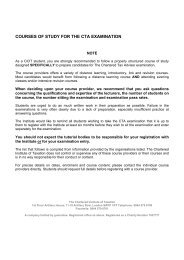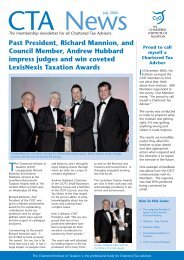Expatriate taxation - CIOT - The Chartered Institute of Taxation
Expatriate taxation - CIOT - The Chartered Institute of Taxation
Expatriate taxation - CIOT - The Chartered Institute of Taxation
You also want an ePaper? Increase the reach of your titles
YUMPU automatically turns print PDFs into web optimized ePapers that Google loves.
<strong>CIOT</strong> RESEARCH PROJECT ON EXPATRIATE TAXATION<br />
5 Issue 5: Domicile: State or federal<br />
5.1 This issue is whether domicile is a relationship that is applicable to a country<br />
or federal entity (eg the USA, Switzerland, UK) or to a lesser legal jurisdiction<br />
(eg New York State, Zug Canton, Scotland). It has an impact for Britons with<br />
domicile <strong>of</strong> origin in the UK who have settled abroad, and are now expatriates<br />
who come to the UK and will move to a new location (not back home) after<br />
the assignment has completed. It will also apply to many other countries with<br />
a level <strong>of</strong> domiciliary jurisdiction below the country level. Canada, Spain,<br />
Australia and China are countries that immediately spring to mind as ones<br />
with sub-country legislatures. Yugoslavia, Russia and Czechoslovakia are<br />
classic historical examples.<br />
5.2 <strong>The</strong> US sends many expatriates to the UK, and the issue <strong>of</strong> an expatriate who<br />
moves permanently from one US state to the UK and then on to another state<br />
or country raises questions.<br />
Applicable law<br />
5.3 As Issue 4, there is no statutory legislation, and the tax cases and other<br />
cases remain the same. However, it is interesting to note that, until recently,<br />
people were regarded as domiciled in the UK and, <strong>of</strong> course, all <strong>of</strong> tax law<br />
refers to people domiciled in the UK.<br />
Current practice<br />
5.4 Until 2004, this issue was given very little consideration as it was <strong>of</strong> limited<br />
practical impact and HMRC never appeared to take the point. However, the<br />
incidence <strong>of</strong> domicile affects so many areas <strong>of</strong> <strong>taxation</strong>, as seen above in<br />
Issue 4, that it can be important in those cases where it has an impact.<br />
5.5 Practice varies across the pr<strong>of</strong>ession, and within single firms <strong>of</strong> accountants<br />
there will be conflicting views, so it is impossible to say what the current<br />
practice is.<br />
5.6 <strong>The</strong>re is a reference to this situation by HMRC on their website at the<br />
technical manual references IHTM13021 and IHTM1302.<br />
5.7 HMRC now argue (they never did “overtly” in the last century) that you are<br />
domiciled to a state/canton/province, as opposed to the overriding country,<br />
where there are separate laws covering the state/canton/province. This<br />
means that, for those with a UK domicile <strong>of</strong> origin who establish a domicile <strong>of</strong><br />
choice in another location, there is a risk that an assignment to the UK for<br />
employment will trigger a return to the UK domicile. This would especially be<br />
so for expatriates who have “back to back assignments”, ie those coming to<br />
the UK who then move to a new “expatriate” location and do not return home.<br />
Peter Ashby 24 6.2.07


